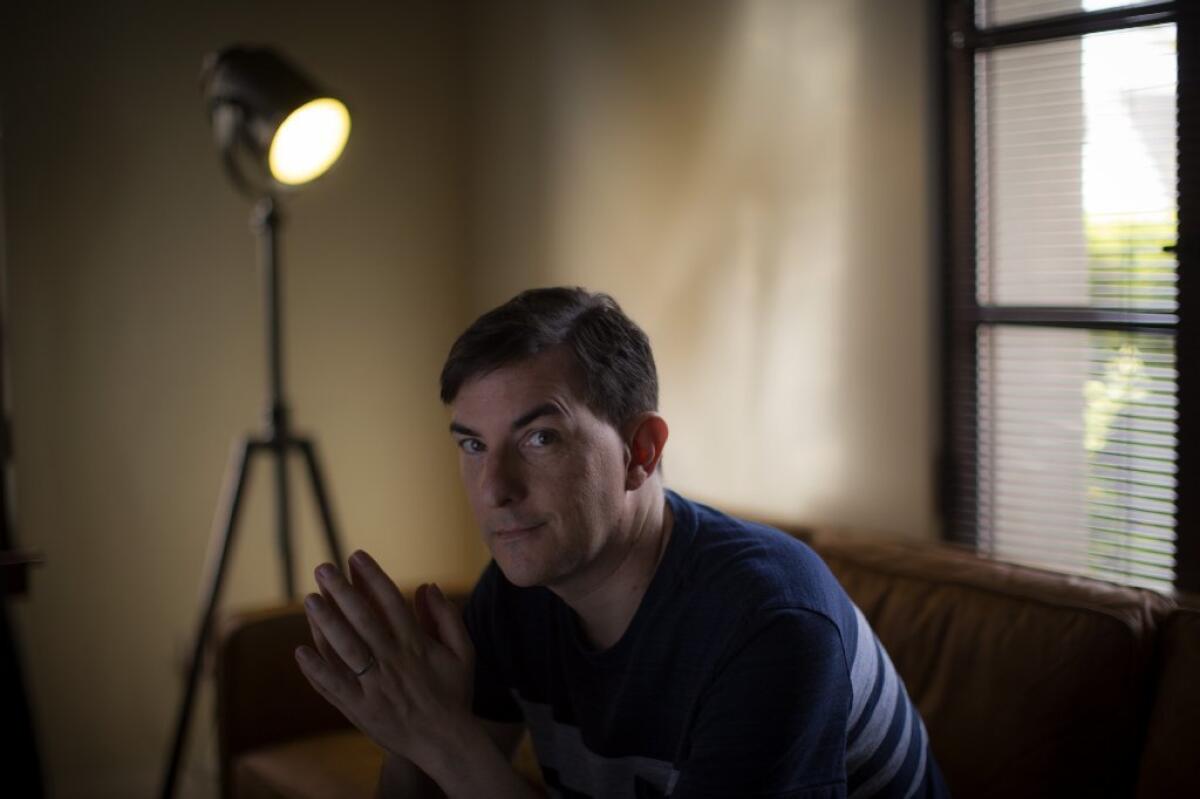On Writing: It can get tricky when your characters are smarter than you, as in ‘Arrival’

- Share via
I’d carried around Ted Chiang’s collection of short stories for a long time. For a while, the dog-eared book lived in my car, and I’d reread pieces of it when I was early to a meeting on a studio lot. So much of Ted’s work resonated with me, none more than the titular story, “Story of Your Life,” and when asked if there was any dream project I wanted to adapt, I pushed this one first and hardest.
It wasn’t because the story itself was particularly cinematic — in fact, much of it played strictly as a literary conceit, not a filmic one. But when I think about translating a novel or short story to screen I’m never that concerned about how visual it is, but rather how it makes me feel. That’s what I want to share with the world.
Of course, that poses a problem when convincing producers to give me the chance. For a year or more, I offered “Story of Your Life” as my favorite science fiction piece, eager to talk about how to make it a movie. None connected with it, until almost by accident I met with Dan Levine and Dan Cohen at 21 Laps, and then I understood the power of finding one “yes” after so many rejections.

Amy Adams, Jeremy Renner and Forest Whitaker star in “Arrival.”
My adaptation began as a pitch, and half of my time spent in the room was akin to a rough-edged TED talk about the nature of language, along with tangents about Fermat’s Principle of Least Time and statistical theorems. There’s a moment when you know you’ve lost your audience — that glazed-over look in their eye — and I saw it happen early and often. We didn’t sell the pitch, not even with my stack of index cards color-coded to illustrate the timelines in the narrative. (Perhaps it didn’t sell because of this.)
But I couldn’t shake this story. Having done so much work already, and then not selling the pitch, it was like being a marathon runner with my feet on the starting blocks, but the gun never goes off. So I decided to write the script on spec. To do that required a more formal option of the source material, which meant I had to pitch the adaptation one more time: to the author himself, Ted Chiang.
I’m grateful Ted couldn’t see me — we held the pitch over a conference call — because I was the most nervous I’d ever been in my career. After a long pause at the end of my pitch, he agreed to give me a year. I started writing that night, and used up the entire year developing it.
The script itself was a challenge like no other. I was writing for characters much smarter than myself, facing their own greatest challenges. Ted’s story offered me some groundwork, but I had to find drama and conflict within the linguistic theory to sustain something for a feature film. And a linguist and theoretical physicist couldn’t talk like I do, or else it felt like they were talking down to me. I had to let the smartest people in the room act like it, even if it meant I couldn’t always keep up.
Beyond that, the central puzzle of the story was an alien language. I’d attempted to describe on the page how the heptapod logograms might look, but it wasn’t enough. So I invented a crude series of cuneiforms, to import into the script document each time I saved it as a PDF. These weren’t ever designed to be the symbols for the film, but rather a basic visual aid. Yet I think they were often more arresting than my own writing.
While all of that science and language work went through a hundred iterations, what remained constant was the main character Louise’s emotional journey”
— Eric Heisserer
While all of that science and language work went through a hundred iterations, what remained constant was the main character Louise’s emotional journey. The beginning and ending of the film never really changed from my first draft, dated early 2011. And three years later, in 2014, Louise’s journey is what captivated director Denis Villeneuve.
I remember being so worried about attaching a director who didn’t believe in the deep science and contemporary realism of the movie. I was so scared to lose the intelligence of the material in favor of spectacle or brevity. But Denis embraced it all. He wanted a story with head and heart. He said to me, “If aliens ever land, I want someone like Louise out front. Let’s make this film so we might convince the world.”
I realized then, so many years after reading the short story, why I wanted to adapt it. Because we need more people like Louise.
See the most read stories this hour »
ALSO:
Indie Focus: Fresh takes on genre storytelling with ‘Arrival,’ ‘The Monster’ and ‘The Love Witch’
The challenges of marketing a cerebral science fiction film like ‘Arrival’
More to Read
From the Oscars to the Emmys.
Get the Envelope newsletter for exclusive awards season coverage, behind-the-scenes stories from the Envelope podcast and columnist Glenn Whipp’s must-read analysis.
You may occasionally receive promotional content from the Los Angeles Times.










